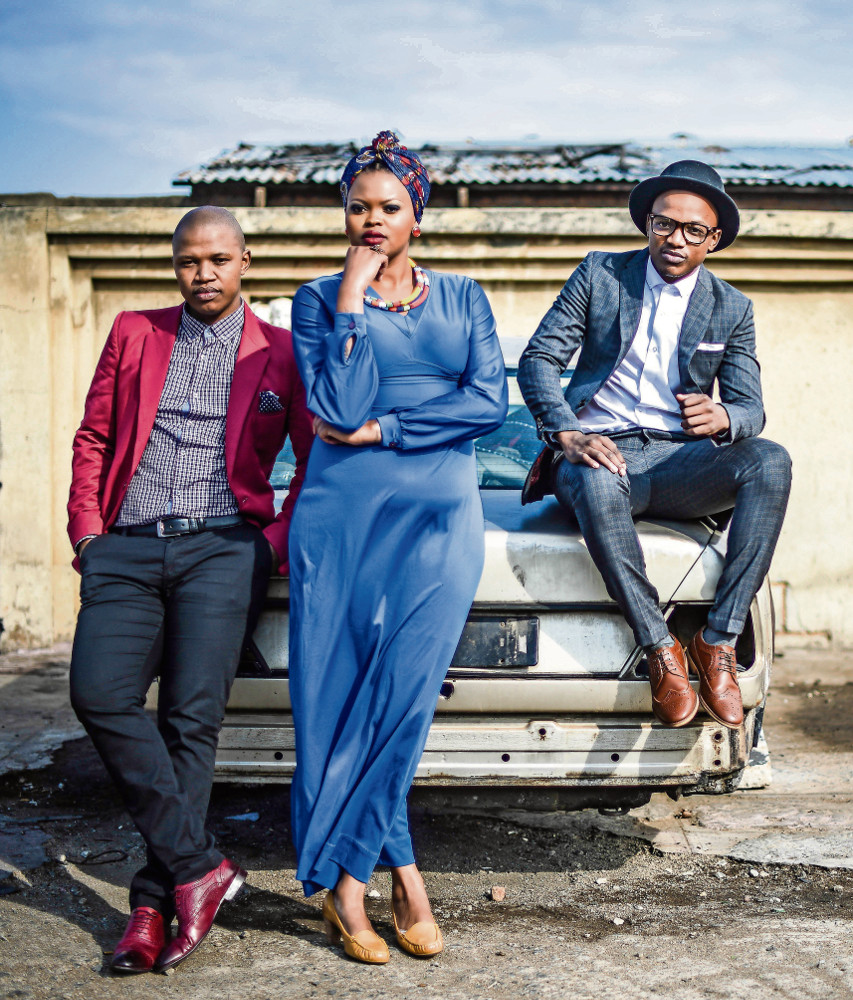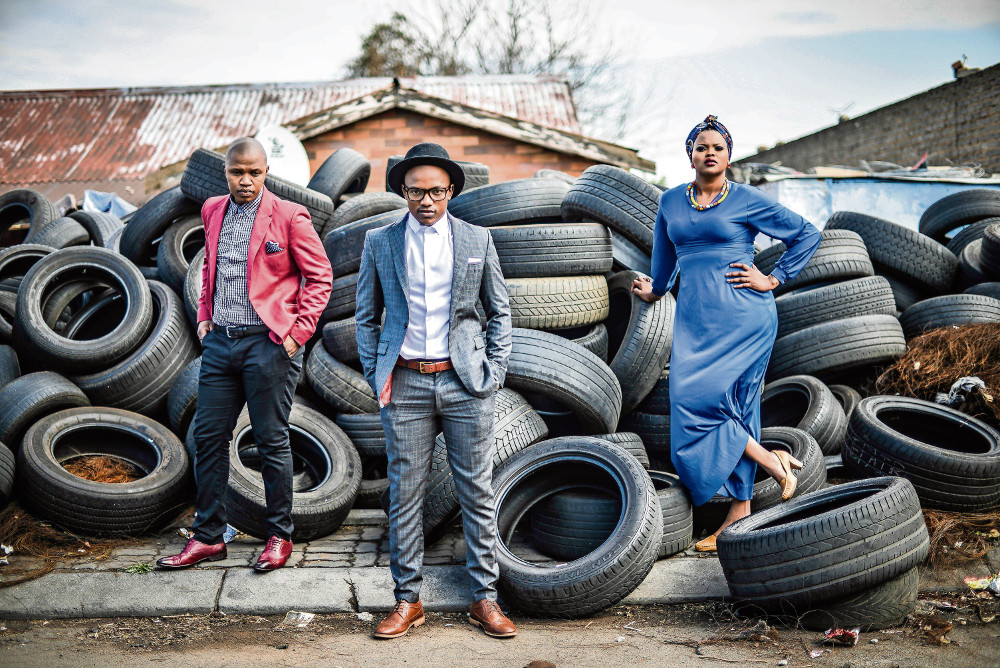Well grounded: The Ngxanga brothers and Buhlebendalo Mda have released their second album
When musicians talk about connecting with their roots, the knowledge of half-forgotten instruments usually surfaces. Perhaps there is within us all something so instinctively human as to bang a drum, to clap, or to pluck a string under tension, perhaps an animal hair or elastic band, to create music.
But The Soil, Soweto’s exciting three-piece vocal group, go back before the invention of instruments – before even “when our forefathers used wood and metal to create mbiras and koras”, says lead composer and singer Ntsika Fana Ngxanga.
A trip back to their roots comes in the wake of the worldwide release of their second album, Nostalgic Moments, to take their music international.
“The first instrument that man ever stumbled upon was the voice,” says Ngxanga, who is confident about The Soil’s a cappella niche. “Early humans were forever roaming from one place to the next and on all these journeys they sang songs or broke out into hymns. It’s still these sounds that the new generation of Africans are echoing,” he says after an electrifying set by The Soil at Britain’s Womad Festival over the weekend.
On stage, Buhlebendalo “Soil Sister” Mda introduces Ntsika as “the next president of South Africa”. She is elevated in the centre of the trio and, in a beam of light coming from the high roof of the festival tent, she revels in her self-described role as “the beautiful, the colourful, the curvaceous”.
To her right is Ntsika’s brother, Luphindo “Master P” Ngxanga, a bullish, rhythmically flawless beatboxer whose charisma is epitomised by a millimetre-fitted orange suit. The crowd whoop in admiration when he erupts into a cheek-puffing, tongue-clicking frenzy. By the end of the set, Ngxanga’s presence is akin to a loyal percussionist whose pace-making skills go unspoken.
There is a hearty appetite around the world for South African vocal groups. What Ntsika calls a “golden era” was spearheaded by Lady-smith Black Mambazo in the 1970s and 1980s, and their international stamp was recognised by four Grammy wins.

In transit, the Mahotella Queens put on the first South African act of the Womad weekend, displaying their stylised, mbaqanga-heavy, groove-loving spirit – and with a jiggle-hipped enthusiasm most people half their age would envy.
“They are icons that we look up to,” says Buhlebendalo, evidently connecting with South Africa’s unstoppable female vocal force.
“When a crowd watches us after the Mahotella Queens, we get to be associated with their music because there’s a similar harmony. They have been together for over 30 years, which is something we can only dream of.”
Since the death of Simon “Mahla-thini” Nkabinde, the Mahotella Queens have had an additional association with The Soil – three singers. But this was not always the case. Mda and the Ngxanga brothers met at Soweto’s Tetelo Secondary School, and discovered a vocal affinity in a 20-piece vocal group.
Unlike the strength-in-numbers approach of Ladysmith Black Mambazo, The Soil chose to hone its membership down to what they consider to be a magic number – three – although there is a spiritual nod to God as a fourth element; religion is at the heart of The Soil.
Mda declares this, and the trio charges the Womad festival tent with the energy of a Gospel church. “Put yourself in a family during a blackout when people are singing and you would swear you could feel electricity,” says Ntsika about the power of the voice. The frequent blackouts in South Africa have had a bizarre positive spin-off and they laugh about the benefits of a few hours without soapies or game shows on television.
“Blackouts shine a light on family dynamics by encouraging communication,” Ntsika says. “And, if you come from a musical family – and there are many where blackouts are most common – something beautiful is created.”
Another evident bond between South African music and the voice lies in the nation’s many official languages. The Soil pride themselves on being able to speak all 11. Mda sums it up with her spiritual and militant authority. “We are one,” she says. “We think as a collective with a shared mission.

“I feel that any nation that doesn’t pay attention to its culture and heritage is a doomed nation,” Ntsika adds, with presidential clarity. “To learn a language, you must give yourself time to learn about other peoples’ cultures.
“We have united South Africa without even trying. Charity begins at home, and that’s exactly what we have done. Now our ambition is to create a soundtrack for the rest of the world.”
The first track of Nostalgic Moments, Unspoken Words, captures The Soil’s linguistic ambitions perfectly. Luphindo breathes the album into life with a simple beatbox, before vocals hit in a rich wave, with words blended into one. The language is made up, which highlights the incredible power music has in transmitting a message irrespective of literal understanding.
The true meaning is both secret and universally accessible; as Ntsika points out, Miriam Makeba translated a few songs into English before going into exile in the United States and she used whatever dialects she wanted to. Western audiences were drawn to the raw sounds.
When appropriate, she explained the meaning of songs loosely without giving a literal translation. For The Soil, a love of Soweto is as important as a love of South Africa, and they have branded their music as kasi-soul.
Ntsika concedes that anyone from any township will always vouch for it. He appreciates Soweto for its “mash-up” of South African clans, which has formed an intricate, eclectic environment. It underscores The Soil’s claim to have united South Africa through their deep understanding of its complex cultural diversity.
Besides her love of “that special Soweto taste”, Mda looks one step beyond: perhaps there’s a Soweto in every country where you’ll find the whole nation condensed, she says.
The Soil have taken care not to overlook South Africa’s recent music history. Luphindo’s beatboxes have evident hip-hop flavours, and all three members are quick to nod appreciatively when kwaito names like Mandoza and Zola are mentioned.
Ntsika cites the Kalawa Jazmee record label as being particularly inspirational for giving a platform to the kwaito pioneers, Oskido and Spikiri. When gangster rap started in the US, these producers knew originality was essential to the South African brand of hip-hop they aspired to create. Kwaito emerged, and an upbeat tempo further distanced it from the US to give it a new identity.
“We take a big inspiration from kwaito by beatboxing,” says Ntsika. “This is a fundamental part of kasi-soul music. We have always used that tag, and now anyone who dips into the huge belly of South African soul music and picks out our name will know that we make soul music with Soweto origins.”
Nostalgic Moments was released by Native Rhythms Productions in September last year and has been made available internationally from July 24, courtesy of Proper Music